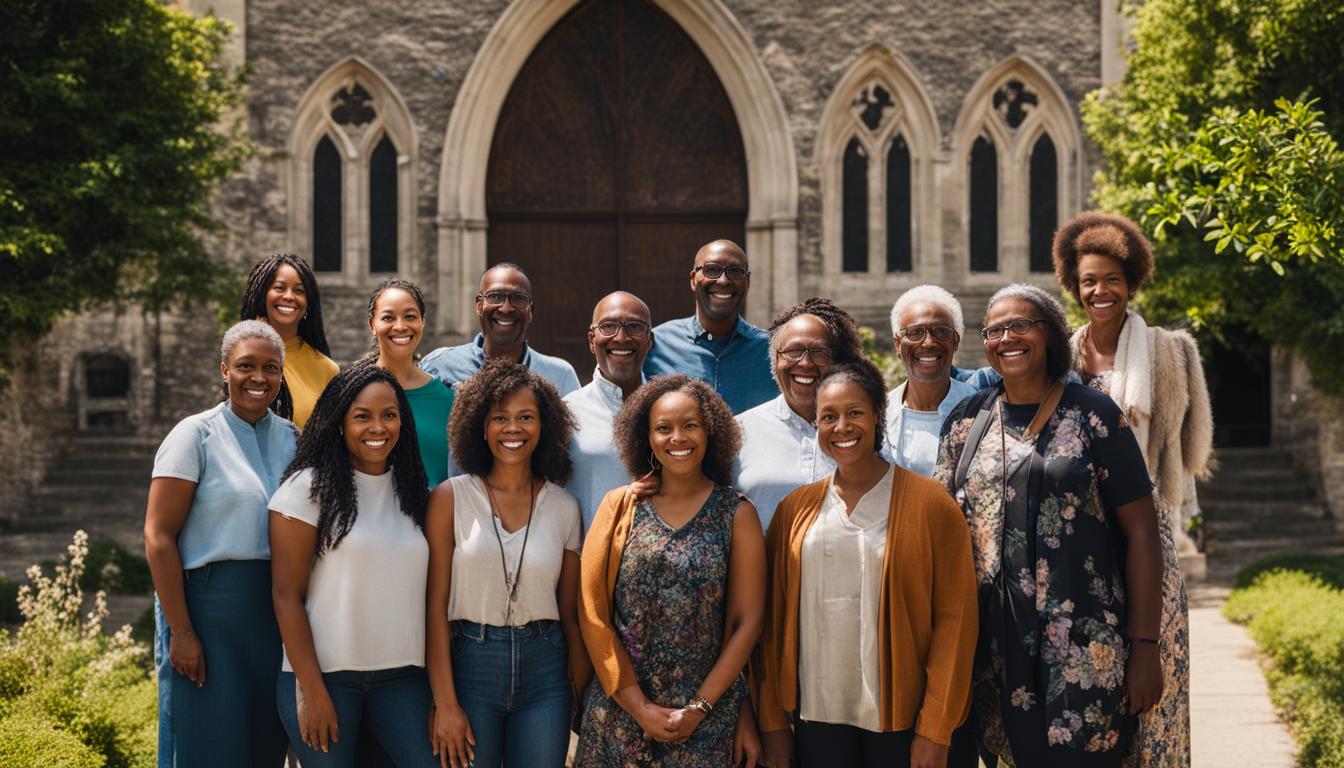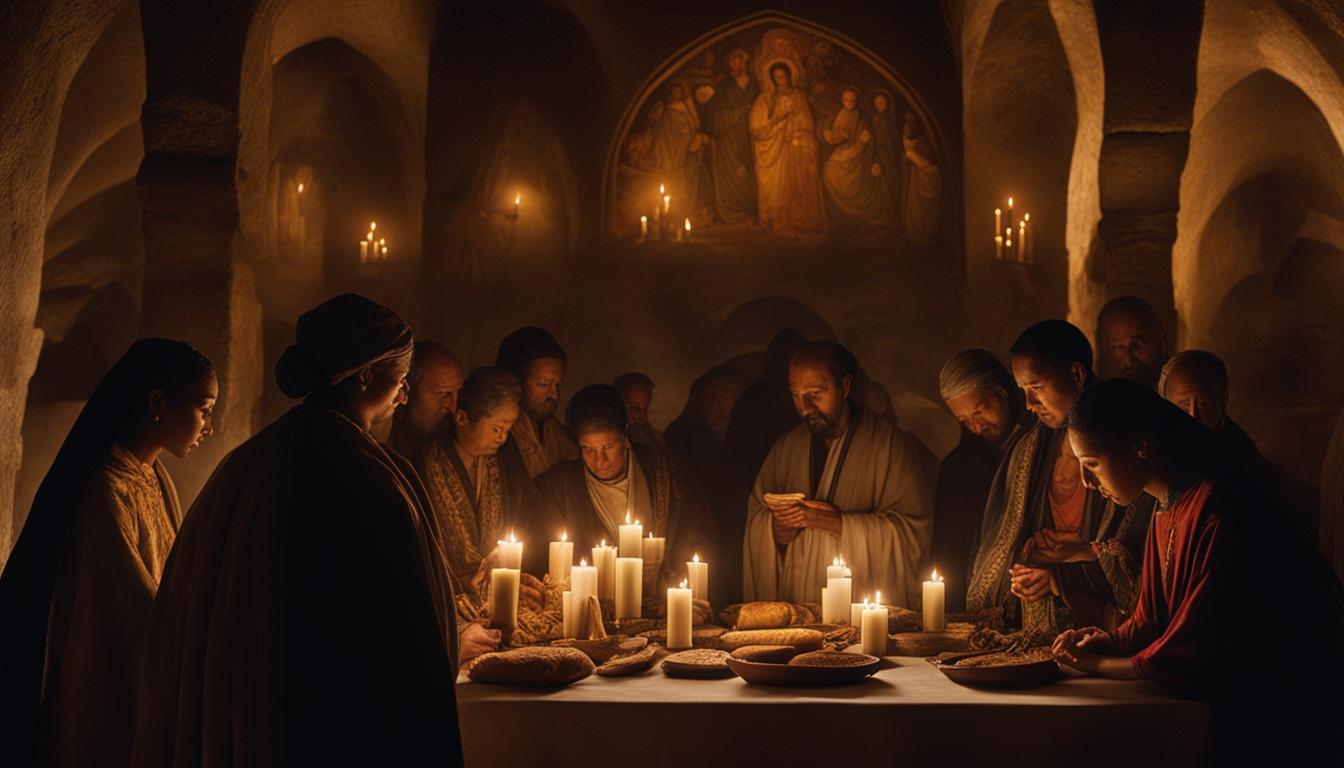Welcome to our comprehensive guide on church government, where we delve into the intricacies of ecclesiastical structure, and the crucial role it plays in the governance of churches. Church government determines how decisions are made, how resources are managed, and how the mission of the church is fulfilled.
Understanding church governance is essential for both church leaders and members as it enables effective management, organizational efficiency, and the ability to adapt to the ever-changing religious landscape.
In this guide, we will explore the different aspects of church government, including its historical context, the role of church leaders, and the transformative potential of the church in society.
Key Takeaways:
- Church government determines how decisions are made and resources are managed.
- Understanding ecclesiastical structure is crucial for effective church management.
- Church leaders play a vital role in governance and decision-making.
- The church has a rich history of transforming and changing society.
- The Reformation period brought significant changes to church governance.
The Importance of Effective Church Management
Effective church management is crucial for the growth and success of a church. While churches may not have the same management requirements as business organizations, they still engage in activities that necessitate adequate planning and execution. Good governance and management practices ensure the efficient utilization of resources and contribute to the overall development of the church.
One key aspect of effective church management is maintaining a clear organizational structure. A well-defined hierarchy helps to streamline decision-making processes and facilitate communication among church leaders and members. Whether it’s a small local church or a large denominational organization, having a clear chain of command and well-defined roles and responsibilities ensures that tasks are carried out efficiently and effectively.
In addition to organizational structure, church administration plays a crucial role in managing the day-to-day operations of the church. This includes handling finances, coordinating events and programs, overseeing staff and volunteers, and ensuring compliance with legal and regulatory requirements. Effective administration ensures that the church’s resources are used wisely and that programs and services are delivered to the congregation and the community.
Furthermore, effective church management involves fostering a culture of accountability and transparency. This includes establishing policies and procedures that promote ethical conduct and responsible stewardship of the church’s resources. By holding leaders and staff members accountable for their actions and decisions, trust and confidence are built among the congregation, enabling the church to operate with integrity and credibility.
Table: Key Components of Effective Church Management
| Component | Description |
|---|---|
| Clear Organizational Structure | Establishing a hierarchy and defining roles and responsibilities |
| Church Administration | Managing finances, events, staff, and compliance |
| Accountability and Transparency | Promoting ethical conduct and responsible stewardship |
By prioritizing effective church management, churches can optimize their operations, fulfill their mission, and make a positive impact on their congregation and community. Investing in the development of leadership skills, implementing sound governance practices, and leveraging technology can all contribute to the overall effectiveness of church management.
The Role of Church Leaders in Governance
Religious leadership plays a crucial role in the governance of a church. Church leaders are entrusted with the responsibility of setting protocols, making important decisions, and guiding the overall direction of the church. Their leadership style and decision-making processes greatly impact the effectiveness of church governance and the ability to achieve the church’s goals.
Types of Church Leaders
Church leaders can encompass various roles and responsibilities within the governance structure. Some common types of church leaders include:
- Pastors or Ministers: These individuals are responsible for providing spiritual guidance and leading the congregation in worship and religious activities.
- Elders or Deacons: They play a supportive role in the church, offering guidance, advice, and assistance to the pastor and congregation.
- Church Board or Council Members: These individuals are responsible for making important decisions regarding the church’s finances, policies, and overall direction.
Each type of church leader brings unique qualities and perspectives to the governance process, contributing to the overall effectiveness of church management.
“The function of leadership is to produce more leaders, not more followers.” – Ralph Nader
Church Protocols and Decision-Making Processes
In order to ensure effective governance, church leaders establish protocols and decision-making processes that guide the operations of the church. These protocols may include guidelines for financial management, conflict resolution, and the appointment of new leaders. Decision-making processes may involve consultation with the congregation, seeking input from various stakeholders, and prayerful consideration of the church’s mission and values.
By establishing clear protocols and decision-making processes, church leaders promote transparency, accountability, and unity within the church community. This allows for informed decision-making and ensures that the church’s governance aligns with its mission and purpose.
The Historical Influence of the Church on Society
The history of the church is intertwined with the transformation of society. Over the centuries, the church has played a pivotal role in shaping social norms, advocating for justice, and championing the welfare of communities. From its earliest days, the church has been a force for change, often challenging existing power structures and promoting equality.
A notable example of the church’s influence on society can be seen during the medieval period. The church established universities, promoted literacy, and laid the foundation for modern education. The monastic orders provided shelter, food, and healthcare to the poor and vulnerable, highlighting the church’s commitment to social welfare. Additionally, the church played a central role in the emergence of the concept of human rights, championing the dignity and worth of every individual.
“The church has always been at the forefront of societal transformation, advocating for justice and righteousness,” says Dr. Emily Thompson, a renowned historian. “From the abolition of slavery to the civil rights movement, the church has been a catalyst for change, challenging oppressive systems and fostering a more equitable society.”
Churches continue to play an active role in transforming society today. They provide assistance to those in need through various community programs, such as food banks, homeless shelters, and counseling services. Additionally, churches are often at the forefront of advocating for social justice issues, addressing systemic inequalities and promoting inclusivity.
| Church’s Impact on Society | Examples |
|---|---|
| Promoting Education | Establishment of universities and schools |
| Social Welfare | Providing food, shelter, and healthcare to the marginalized |
| Human Rights Advocacy | Championing the dignity and worth of every individual |
| Societal Transformation | Leading movements for justice and equality |
The Reformation and its Impact on Church Governance
The Reformation period, which took place in the 16th century, was a time of significant religious and social change. It marked a fundamental shift in the way churches were governed and structured, challenging the traditional authority and hierarchy of the Catholic Church. The reformers, such as Martin Luther and John Calvin, advocated for a more decentralized and egalitarian approach to church governance, emphasizing the priesthood of all believers.
This period of church reform had a profound impact on the structure and organization of churches. It led to the formation of various Protestant denominations, each with its own distinct governance systems. The power of the clergy was diminished, and the authority to interpret and teach the Bible was extended to individuals. This democratization of religious authority gave rise to a more participatory and inclusive form of church governance.
One of the key principles of the Reformation was the idea that the church should be governed by a council or assembly of elected representatives, rather than by a single individual or hierarchy. This shift from a vertical to a horizontal structure allowed for greater accountability and transparency in decision-making. It also allowed for the active involvement of the laity in church affairs, enabling a more democratic and community-oriented approach to governance.
| Reformation Era | Impact on Church Governance |
|---|---|
| Challenged traditional authority and hierarchy | Shifted power from clergy to laity |
| Advocated for a decentralized and egalitarian approach | Promoted participatory and inclusive governance |
| Established different Protestant denominations | Introduced diverse governance systems |
| Emphasized the priesthood of all believers | Extended religious authority to individuals |
“The Reformation era was a time of great upheaval and transformation in the church. It challenged the established norms of governance and paved the way for new ideas and practices. The emphasis on individual religious authority and the active participation of the laity laid the foundation for a more democratic and inclusive church structure.”
The Church as a Change Agent in South Africa
The church in South Africa has long been at the forefront of social change and community transformation. In a country marked by a history of apartheid and racial inequality, the church has played a vital role in advocating for justice, equality, and reconciliation. It has been a beacon of hope, inspiring and empowering communities to overcome adversity and work towards a better future.
One of the key missions of the church in South Africa is to address the pressing social issues impacting the marginalized and vulnerable populations. Through various outreach programs and initiatives, the church actively engages with the community, providing support, guidance, and resources. It takes a holistic approach to community transformation, addressing not only material needs but also spiritual and emotional well-being.
The mission of the church in South Africa goes beyond its traditional role as a spiritual institution. It recognizes that its responsibility extends to transforming society and creating a more just and equitable world. This commitment is reflected in the church’s involvement in areas such as education, healthcare, poverty alleviation, and advocacy for human rights. By mobilizing its resources, networks, and expertise, the church aims to bring about meaningful and sustainable change in the lives of individuals and communities.
“The church in South Africa has a unique opportunity to shape the future of our nation. It has the power to break down barriers, bridge divides, and foster unity,” says Reverend Thabo Molefe, a prominent leader in the South African church. “By embracing its mission of community transformation, the church can be a catalyst for social change and healing.”

In conclusion, the church in South Africa plays a pivotal role as a change agent, working towards community transformation and social justice. Its mission extends beyond the spiritual realm, encompassing the economic, social, and political dimensions of society. Through its commitment to advocating for justice and equality, the church brings hope, healing, and empowerment to individuals and communities. By collaborating with other stakeholders and actively engaging with the needs of the people, the church in South Africa continues to make a lasting impact.
The Missional Church and its Transformative Potential
The rise of the missional church has brought a renewed focus on the transformative potential of the church. A missional church is not content with simply conducting traditional religious activities, but actively seeks to engage with and impact the surrounding community. By shifting the focus from internal to external, from programs to people, and from church-based to kingdom-based, the missional church seeks to bring about meaningful change in society.
One of the key characteristics of a missional church is its commitment to social justice and addressing the needs of the marginalized. It recognizes that the church has a responsibility to act as a catalyst for positive change and to advocate for fairness and equality. This involves actively reaching out to those in need, providing support and resources, and working towards systemic change.
“The missional church recognizes that our faith is not just about personal salvation, but about actively participating in God’s mission to restore and redeem the world,” says Rev. Michael Johnson, a leader in the missional church movement. “It encourages us to see ourselves as agents of transformation, seeking to bring hope and healing to those who are hurting.”
By engaging in community development projects, partnering with local organizations, and mobilizing its members, the missional church can make a real difference in the lives of individuals and the wider society. It actively seeks to address issues such as poverty, inequality, and injustice, striving to create a more just and compassionate world.
| Impact of the Missional Church | Examples |
|---|---|
| Community Transformation | Establishing community centers, providing educational opportunities, and supporting local initiatives |
| Social Justice Advocacy | Engaging in campaigns for equality, fighting against discrimination, and advocating for human rights |
| Empowering the Marginalized | Offering job training, mentoring programs, and resource support to those in need |
Engaging the Next Generation
The missional church is also well-positioned to engage and inspire the next generation. By focusing on relevant issues and social causes, it becomes a place where young people can find purpose and meaning. This helps to combat the decline in church attendance among the younger demographic and ensures a sustainable future for the church.
In conclusion, the missional church has the potential to bring about significant transformation in society. By embracing its role as a change agent and actively engaging with the needs of the community, the church can make a positive impact and contribute to a more just and compassionate world.
The Church’s Role in Social Welfare
The church has always been committed to serving and ministering to the poor and vulnerable in society. Through various community service programs, churches have made a significant social impact, providing material assistance, emotional support, and a sense of hope to those in need.
Community service initiatives, such as food banks, homeless shelters, and counseling centers, demonstrate the church’s dedication to social justice and compassionate care. These programs not only meet immediate physical needs but also offer a holistic approach by addressing emotional, spiritual, and relational aspects of individuals and families.
“The true measure of any society can be found in how it treats its most vulnerable members.”
By actively engaging in social welfare, the church exemplifies the teachings of Jesus Christ, who urged his followers to love their neighbors and care for those in need. Through their service, churches provide practical assistance, uplift the marginalized, and bring hope to those facing difficult circumstances.
Examples of the Church’s Social Impact:
Table: Church Community Service Programs
| Program | Description | Impact |
|---|---|---|
| Food Banks | Providing groceries and meals to families experiencing food insecurity | Reduces hunger and malnutrition in the community |
| Shelters | Offering temporary housing for the homeless | Provides a safe and secure environment for individuals and families |
| Counseling Centers | Providing mental health support and guidance | Assists individuals in coping with emotional challenges and promotes overall well-being |
| Job Training Programs | Equipping individuals with skills for employment | Empowers individuals to achieve financial independence and stability |
These examples highlight the tangible ways in which churches contribute to the welfare of their communities. By actively engaging in community service, churches become beacons of light and agents of positive change, transforming lives and making a lasting impact on society.

The Church’s Changing Role in the Modern World
In today’s rapidly changing world, the church is faced with the challenge of adapting to new societal dynamics while remaining relevant to its members and the broader community. As the influence of technology increases and cultural norms continue to shift, churches are reevaluating their practices and evolving to meet the needs of the modern era.
One key aspect of the church’s changing role in the modern world is the emphasis on inclusivity and diversity. Churches are recognizing the importance of creating spaces where all individuals feel welcome, regardless of their background, race, or sexual orientation. This shift in perspective reflects the growing understanding that the church’s purpose is to serve and support individuals at all stages of life, fostering a sense of belonging and community.
Another significant change is the integration of technology into church practices. Churches are leveraging digital tools and online platforms to broaden their reach and engage with a larger audience. Virtual services, online communities, and interactive websites provide opportunities for individuals to connect with the church and participate in religious activities, even from a distance. This evolution in church practices not only accommodates the needs of those who are unable to attend in-person, but it also allows the church to extend its presence beyond physical boundaries.
| Traditional Church Practices | Evolving Church Practices |
|---|---|
| Primarily in-person services and gatherings | Blending in-person and virtual services |
| Homogenous congregations | Diverse and inclusive congregations |
| Limited use of technology | Integration of digital tools and online platforms |
| Focus on internal activities | Outward-focused engagement with the community |
| Traditional worship styles | Contemporary and culturally relevant worship styles |
Additionally, the church’s changing role in the modern world involves a shift towards community engagement and social justice. Churches are increasingly focused on addressing social issues, advocating for justice, and actively participating in community service projects. By aligning their mission with the needs of the community, churches can have a tangible and positive impact, fostering transformative change within society.
The church’s relevance in the modern world lies in its ability to adapt and evolve, embracing new practices and approaches while staying true to its core values. As churches continue to navigate the complexities of the modern era, they have the opportunity to transform lives, foster community, and create a meaningful impact on the world around them.

Conclusion
Church government is a vital aspect of church management and governance dynamics. Understanding the structure, roles, and influence of church government is crucial for effective decision-making and successful church operations. By embracing the principles of transparency, accountability, and inclusivity, church leaders can guide their congregations towards community transformation and social justice.
As churches navigate the complexities of the modern world, it is essential to recognize the transformative potential they possess. By actively engaging with their surrounding communities, churches can become change agents and make a positive impact on society. The mission of the church extends beyond the spiritual realm, encompassing the holistic well-being of individuals and the welfare of the community.
This church government guide has provided a comprehensive understanding of the dynamics of church governance and the evolving role of the church in the modern era. By prioritizing relevance, adaptability, and inclusivity, churches can effectively address the diverse needs of their congregations and respond to contemporary issues.
By embracing their role as change agents and working towards community transformation, churches can fulfill their mission of spreading love, compassion, and social justice. The dynamics of church governance are not only essential for the growth and development of churches, but also for creating a positive impact in the world.
FAQ
What is church governance?
Church governance refers to the management practices and organizational structure of a church that directly impact its success and ability to fulfill its mission.
Why is effective church management important?
Effective church management ensures the efficient utilization of resources and contributes to the overall growth and success of the church.
What role do church leaders play in governance?
Church leaders are responsible for setting protocols, making important decisions, and guiding the overall direction of the church.
How has the church historically transformed society?
Throughout history, the church has actively engaged in the welfare of the community, advocating for social justice and bringing about positive change.
How did the Reformation impact church governance?
The Reformation challenged existing structures and practices, bringing about changes in the organizational structure of churches and giving rise to various denominations with distinct governance systems.
What role does the church play in South Africa?
The church in South Africa has played a crucial role in advocating for justice, equality, and reconciliation, beyond the spiritual realm.
What is the missional church?
The missional church actively seeks to engage with and impact the surrounding community, shifting the focus from internal to external and bringing about meaningful change in society.
How does the church contribute to social welfare?
The church provides material assistance, emotional support, and counseling to the poor and vulnerable through community service programs.
How does the church adapt to the modern world?
Churches are increasing their focus on relevance, adaptability, and inclusivity to meet the diverse spiritual and social needs of their congregations.
What is the role of church government?
Church government plays a crucial role in the growth, development, and impact of churches by ensuring effective management and decision-making.
Source Links
- https://www.academia.edu/52508203/Exploring_the_Influence_of_Good_Governance_Church_Management_and_Structure_on_the_Development_and_Growth_of_the_Church
- https://www.churchpublishing.org/contentassets/67f14b867c35482eafb2b2c44546c60b/church-cracked-open_reflection-action-guide.pdf
- http://www.scielo.org.za/scielo.php?script=sci_arttext&pid=S0259-94222017000300025
















